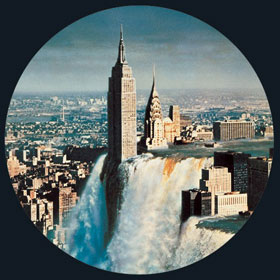Zonoscope By Cut Copy

4.5/5
Upon releasing their previous album, 2008's critically acclaimed #167 In Ghost Colours, Aussie keepers of the '80s synth-pop/New Romantic flame Cut Copy ascended to the ranks of indie electronic groups whose albums might be reviewed by mainstream print publications that impact widespread public opinion like Spin and Rolling Stone.
Perhaps the most immediately striking and impressive feature of Zonoscope, their latest release on Modular–an Australian Indie label distributed by Universal–is its album cover: an eerie, beautiful and somewhat menacing image of a waterfall superimposed over the New York skyline. While it's tempting to call this an instantly iconic bit of album art, shower the band with praise for its groundbreaking achievement in design and packaging, and perhaps even conclude, on the strength of the album cover alone, that Zonoscope contains equally important and indelible music, there are, alas, two flies in the ointment: firstly, the image is cropped from a 30-year-old production by the Japanese photomontage artist Tsunehisa Kimura, who died in 2008; secondly, the image was already used as an album cover for Paul Schütze's 1996 Site Anubis album.
Surely the former "fly" can be ignored given that familiar (or less familiar) paintings and photographs have been rock album art staples for about 30 years, but the idea of a band–one called Cut Copy, no less; as in "cut, copy and paste": get it?–copying another band's copy is actually a little depressing, as I'm sure it wasn't intentional. It not only suggests that "everything has," to quote a pesky cliche-about-cliches, "been done," but also seems to suggest that "everything has been done twice." After all, this is a 2010 indie band wallowing in '80s synth-pop as learned by 2000s bands like Daft Punk. However, the vast majority of the material on Zonoscope is so implacably sunny, frothy and catchy–so very well-regurgitated–that even the most leery of listeners will be able to overlook its meta-derivative nature.
Owing to its retro production values, reliance upon old tech and its strategic use of undeniably '80s-pop-ish "chord cliches," the album's opening track "Need You Now" could be easily tacked on to the end of a re-released INXS album without anyone batting an eye: a simple, effective and catchy six-minute anthem that never drags on, the song is further complimented by the emotional Bowie-esque wailing of Dan Whitford–because what '80s synth-pop band was complete without a David Bowie sound-alike?–and occasional snatches of near-subliminal, vocoder-ed harmonies. Even stronger are the bubbly, funky "Take Me Over" and "Hanging Onto Every Heartbeat," which feature tight, groove-oriented disco drumming and even manage to work in acoustic guitars, and "Where I'm Going," a sunshiny kaleidoscope of borrowed sounds and textures that marries Stone Roses-esque pseudo-psychedelia to a clobbering shuffle beat strongly reminiscent of Gary Glitter's "Rock and Roll."
The unironic "song about Egyptology" "Pharaoahs & Pyramids" proves something of a buzz kill as all it really has going for it is a David Byrne impression; in contrast with the others it is merely clever, more like a concerted effort towards fashionable mimicry than a genuine synthesis. "Blink and You'll Miss a Revolution" isn't all that distinct to it, save for some atmospheric synth flourishes and the unusual choice of implementing a looped vocal sample during the chorus.
While we're on the subject of copies of copies, "This Is All We've Got" may strike the informed listener as vaguely reminiscent of The Jesus and Mary Chain even before the instantly recognizable drum beat from The Ronettes' "Be My Baby" makes an appearance–the selfsame drum beat which that group "quoted" famously in "Just Like Honey." The song's stylistic dissimilarity to the half-hour of music preceding it may prove too jarring to the listener, while its radical leaps in not only style, but genre, "artist being copied" and, with its pre-Pythagorean atonal passages, even millennial paradigms of musical theory reek of glue-stick and construction paper.
"Alisa" finds Whitford, having exhausted his Bowie and Byrne voice, exercising a colorless baritone murmur in an attempt to further emulate the Jesus and Mary Chain, but restores his band to the more comfortable domain of tough disco-funk, this time with lousy drumming. "Corner of the Sky" is the album's dramatic penultimate anthem over a slowed-down house beat, which is enjoyable enough but I couldn't stop thinking of "The Sounds of Silence" and the 15-minute "Sun God" is a bit of a 15-minute mess: I genuinely believe the band wanted to create an actual 15-minute song and "settled" for an haphazardly limned Abbey Road-esque "medley" with occasional reprises. Despite this egregious addition–which actually takes up one-fourth of the entire album–Zonoscope is an instant classic… or, if you prefer, an instant golden oldie.
RELATED ARTICLES
Get the most-revealing celebrity conversations with the uInterview podcast!







Leave a comment